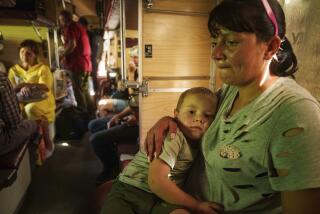Slovenes Trap Tanks, Face a Human Bomb : Combat scene: Amid the strife, residents of the republic are wondering why the West doesn’t help them.
- Share via
KRSKA VAS, Slovenia — Slavko Paic crouched behind an apricot tree for cover as he watched with dread the scene below his hilltop home. From the precarious vantage point that was once his garden, he could see two dozen Yugoslav army tanks trapped on a blasted road, marooned between a river and Slovenian reservists and facing a hill too steep for the armor to climb.
The fertile valley along the burbling Krka River was the scene of intense fighting early Tuesday, when the tank column advanced on this Slovenian hamlet from a garrison a few miles away in the republic of Croatia.
Slovenes of the territorial defense force, angered by the intrusion during a declared cease-fire, booby-trapped a truck and blew up part of the roadway to block the column’s advance.
Federal air force bombers then strafed the road in a vain attempt to free the bottled-up column, Paic said, his version of events bolstered by huge craters visible in the asphalt battleground and surrounding farmland.
“Where is the West now? Where is the United States? Look what is happening to us!” Paic wailed, gesturing toward the rumbling and smoking armor only a few hundred yards below his home. He made a yap-yap motion with his hand, declaring, “About democracy, all they do is talk.”
The clash near Krska Vas, a cluster of vineyards and vegetable patches just about a mile from the Croatian border, was one of many signs that Slovenia’s quest for independence has escalated to open warfare and to a veritable thirst for settling scores with the federal forces that have attacked.
Just a few miles away, in the city of Krsko, federal combat planes bombed Slovenian forces manning defenses around Yugoslavia’s only nuclear plant, raising fears that the desperate army might try to strike the facility itself.
Slovenian officials shut down the plant early Tuesday, and the ground defenses appeared to have been redeployed after the attacks. Nervous Slovenian police stood guard at all intersections, stopping at gunpoint the few cars venturing out on the exposed roads.
In Mokronog, a half-hour drive west, a federal soldier barricaded himself in an army fuel depot, threatening to blow himself and the scenic village to smithereens if any Slovenian reservists dared approach.
“He’s insane,” said one policeman standing watch with an AK-47 about a mile from the human bomb.
Most of Mokronog was evacuated, although a handful of people chose to stay. A bespectacled woman and a shirtless old man watched keenly from behind the flower boxes of a second-floor window across from the roadblock.
Heavy fighting near the village of Smednik, where an army column was reportedly trying to retreat, left smoldering hulks of the armored vehicles, charred corpses hanging from their blown-open ports.
Most of eastern Slovenia is silent and gripped in siege.
The entire Yugoslav economy seems abandoned on the blocked Ljubljana-Zagreb road, where miles of trucks are double-parked, bumper to bumper, left there until the conflict subsides.
Steel girders braced to form tank traps block the main highway between Ljubljana and Zagreb, the respective capitals of the republics of Slovenia and Croatia, both of which declared independence from Yugoslavia last week. Heavily armed reservists check all cars plying the maze of patched and hilly back roads to prevent reinforcement or supplies to the surrounded federal troops.
Nearly the whole country of 2 million seems mobilized for the spiraling conflict. The young and able-bodied man radios and major intersections to relay any suspicious approach. Older men with red armbands and pistols watch country road junctions for signs of a threatened assault.
Here and there the pavement is littered with broken glass, scorched metal and smashed trucks used as mobile bombs, remnants of clashes that have already transpired, the victors seizing the surviving machinery and moving on.
Slovenes caught in the thick of it seem fearful, but determined to deal with the consequences of their defiance.
“They bombed our territorial defense forces this morning,” said a stunned Dragica Barbic, huddled with her family in an outbuilding of a poultry farm about halfway between this village and the nuclear plant. “We would flee, but we have nowhere else to go.”
Paic, watching the idling tank convoy a few miles farther down the narrow, rutted road, said locals are angry but ever more determined to repel what they see as an aggression to enslave Slovenes in the crumbling Yugoslav federation dominated by Serbia.
“Never will Serbia push us to our knees,” Paic vowed. “We are fighting the army because the army is Serbia.”
More to Read
Sign up for Essential California
The most important California stories and recommendations in your inbox every morning.
You may occasionally receive promotional content from the Los Angeles Times.











